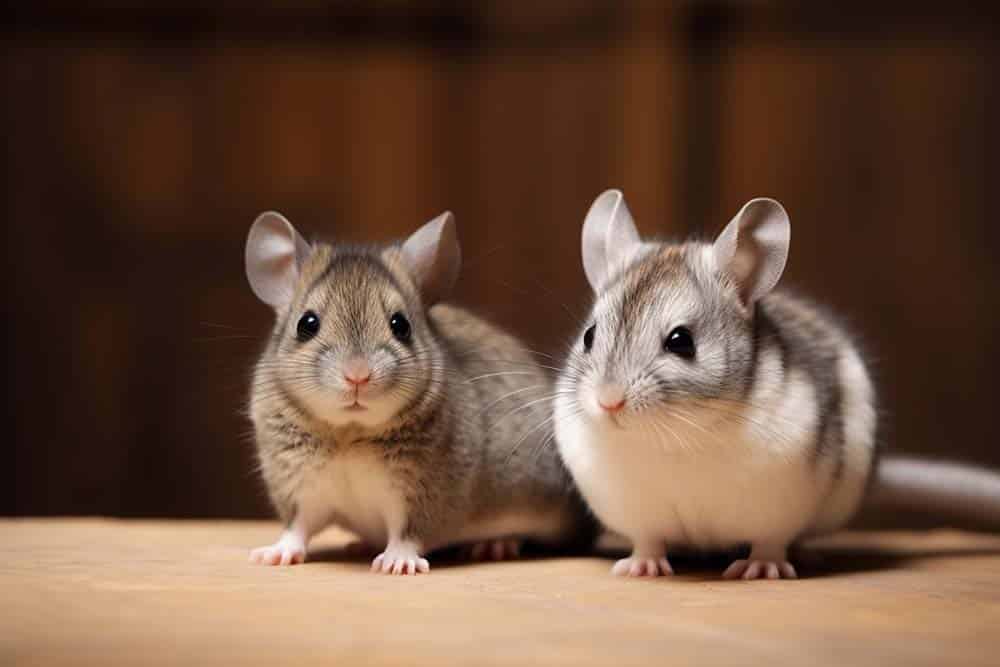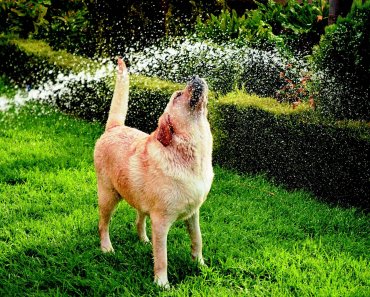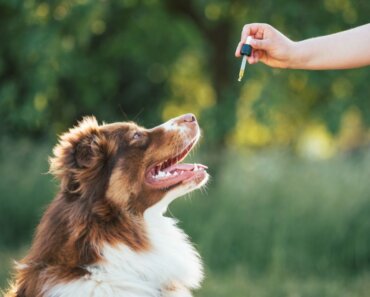
Degus and chinchillas are two of the most adorable animals you can keep as pets. They both belong to the rodent family, but each has distinctive physical and behavioral characteristics that make them unique. While both animals share similarities such as their love for social interaction, they also have some differences that set them apart from each other.
Brief Overview of Degus and Chinchillas
Degus are small rodents that originate from Chile. They have a similar appearance to rats, with short hair and thick tails, but they have a unique coat coloration of brown and beige stripes.
Degus are highly social animals that thrive best in pairs or groups. On the other hand, chinchillas also belong to the rodent family and are native to the South American Andes Mountains.
They have softer and denser fur than degus, which makes them highly sought after for their pelts. Unlike degus, chinchillas prefer solitary lifestyles in captivity.
Explanation of Why People Often Compare the Two Animals
Despite their differences in appearance and behavior, degus and chinchillas are often compared due to their shared traits such as their social behavior, diet preferences, and living conditions. Both animals require dust baths to maintain a healthy coat since they do not produce natural oils like other mammals.
Furthermore, people who enjoy keeping exotic pets may consider either degus or chinchillas due to their unique qualities. Both animals require specific care instructions for keeping them healthy in captivity; thus potential owners must research before committing to owning either animal.
Moreover, while both animals may be similar in certain ways, it is crucial not to assume that they are interchangeable pets since there are significant differences between them that should be considered before making a decision on which one would be suitable for your lifestyle. This article will provide you with detailed information regarding the physical appearance, habitat, diet, behavior, health concerns and popularity of degus and chinchillas as pets to help you make an informed decision on which animal would be the perfect fit for your living situation and lifestyle.
Appearance
Physical characteristics of Degus and Chinchillas
Degus and chinchillas may share some similarities in appearance, but they also have unique features that set them apart. Both animals are small rodents with round bodies, short legs, and bushy tails. They have large eyes and ears that help them navigate their environment.
One major difference between the two is their size. On average, chinchillas tend to be larger than degus.
Adult chinchillas can weigh up to 1-2 pounds while adult degus usually weigh around 6-7 ounces. As for length, a typical chinchilla can grow up to 9-15 inches long while a degu tends to be around 8 inches long.
Differences in fur texture, color, and size
One of the most distinguishable differences between degus and chinchillas is their fur. While both animals have thick coats of fur that protect them from cold temperatures in their natural habitat in South America, their fur textures are distinctively different.
Chinchillas have one of the softest furs on earth with an incredibly dense undercoat that provides insulation against cold weather conditions in the Andes Mountains where they originate from. Their fur color ranges from grayish-black to beige or white.
Degus have coarser hair than chinchillas with longer guard hairs than underfur which makes their coat more stiff and rougher to touch than a chinchilla’s coat. In addition to being rougher textured furry rodents with big ears, these little creatures come in colors such as brownish-yellow or yellow-grey.
Another noticeable difference between the two rodents is how they use their tails: Chinchillas use theirs for balance when jumping great distances while Degu tails are used mostly for communication displays such as when wagging it as a sign of pleasure or curling it up when feeling threatened. Overall the fur of both chinchillas and degus is a standout feature of these cute creatures.
It’s important to note that it’s never recommended for you to touch or hold any wild animals. This is because they may carry diseases, parasites, or viruses that could be harmful to your health.
Natural Habitat of Degus and Chinchillas
Degus and chinchillas are both native to South America, specifically the Andes Mountains. They thrive in arid environments with rocky terrain and plenty of vegetation.
In the wild, degus can be found in large groups living in communal burrows. Chinchillas, on the other hand, are more solitary animals that live in crevices and rocky outcroppings.
Both animals have adapted to their natural environment by developing thick fur coats that protect them from the extreme temperatures of their high-altitude habitat. Degus have short, coarse fur that comes in shades of brown and gray while chinchillas have soft fur in colors ranging from gray to white.
Ideal Living Conditions for Both Animals in Captivity
When kept as pets, both degus and chinchillas require specific living conditions to ensure their health and well-being. For degus, a large cage with plenty of room for exercise is necessary. They are active animals that love to run and play, so providing them with toys and exercise wheels is important.
Additionally, degus need a warm environment between 68-77°F (20-25°C) with low humidity levels. Similarly, chinchillas require a cage with multiple levels for climbing and jumping.
Because they are sensitive to heat stroke, it’s important to keep their living area between 60-70°F (15-21°C) with low humidity levels as well. Chinchillas also need access to dust baths at least once a week to help keep their dense fur clean.
Both animals thrive on a diet of hay supplemented with fresh vegetables like carrots or spinach. Commercial feeds formulated specifically for each animal should also be provided.
It’s important to note that because these animals are social creatures in the wild, they should be kept either alone or in same-sex pairs when kept as pets. Introducing a new animal to an established group can be difficult and stressful for the animals involved.
While degus and chinchillas may have different natural habitats, they both require similar living conditions when kept in captivity. As long as their needs for exercise, proper diet, and temperature control are met, these animals can make great pets for anyone willing to put in the time and effort to care for them properly.
Diet
Typical Diet for Degus and Chinchillas
Degus and chinchillas are herbivores and have similar dietary needs. They both require a diet that is high in fiber, low in fat, and rich in vitamins and minerals. In the wild, degus and chinchillas mostly eat grasses, seeds, fruits, and vegetables.
In captivity, their diet should consist of hay as the main component. Timothy hay is an excellent choice for these rodents as it’s high in fiber content.
They should be given fresh hay every day to ensure they have enough food to graze on throughout the day. In addition to hay, degus, and chinchillas should have a daily supply of fresh vegetables such as carrots, spinach, or kale.
These veggies provide them with essential vitamins like vitamin A which helps maintain good health. Chinchillas can also benefit from occasional treats such as dried fruits or raisins but only in small amounts due to their high sugar content.
Specific Nutritional Needs for Each Animal
While both degus and chinchillas need a diet that is high in fiber content, there are some differences between their specific nutritional needs. Degus require more protein than chinchillas do.
Protein helps with muscle growth and repair which is important for degus who are very active animals. To meet their protein requirements you can add eggs or lean meats but only occasionally since they contain a lot of cholesterol.
Chinchillas need calcium-rich foods to maintain strong teeth structure because their teeth continue growing throughout their life. Giving them calcium supplements like cuttlebone or mineral blocks can help with this requirement.
Both animals should always have access to clean water that is changed daily to prevent potential bacterial infections from developing. Ensure you use a heavy water bowl that cannot easily tip over; plastic bottles could damage their teeth if used incorrectly.
It’s essential to monitor their diet to ensure they’re not over or underfed. Overfeeding can lead to obesity and other health issues, while underfeeding can cause malnourishment and weaken the immune system.
Behavior
Social behavior of degus and chinchillas
Degus and chinchillas are both social animals that enjoy the company of their own kind. Degus are known to be highly social and live in groups of up to 100 individuals in the wild. In captivity, they should be kept in pairs or small groups of the same sex to prevent breeding.
On the other hand, chinchillas are not as social as degus but still benefit from having a companion. It is recommended that chinchillas be kept in pairs or small groups.
Both animals have a hierarchical social structure where dominant individuals establish their position through displays of aggression and dominance over subordinate individuals. This means that owners need to be careful when introducing new animals into an established group as it can lead to fighting and injuries.
Differences in activity level, playfulness, and temperament
Degus are highly active animals that love to play, climb, and explore their environment. They are known for being curious and energetic creatures that require plenty of mental stimulation.
Degus also have a strong scent marking behavior which is used to communicate with each other. Chinchillas, on the other hand, are more reserved than degus and tend to spend more time sleeping during the day.
They are active at night when they tend to run around their cages or play with toys provided by their owners. Chinchillas also have a unique defense mechanism where they will flip their tails if they feel threatened.
In terms of temperament, both animals can make great pets if handled properly from a young age. Degus can become quite tame if handled regularly whereas chinchillas may take longer to warm up to humans due to their natural shyness.
It’s important for owners to understand the personalities of their pets as some degus may be more aggressive than others while some chinchillas may be timider than others. Owners need to be patient and take the time to get to know their pets’ personalities in order to properly care for them.
Both degus and chinchillas have unique social behaviors, activity levels, playfulness, and temperaments that make them interesting pets to own. It’s important for potential owners to research both animals thoroughly before making a decision on which one would be a better fit for their lifestyle.
Health Concerns
Just like any other pet, degus, and chinchillas are prone to certain health concerns. Knowing what these are and how to prevent or treat them is essential in keeping your furry friend happy and healthy.
Common Health Issues for Degus and Chinchillas
Degus are prone to dental problems such as overgrown teeth, which can lead to painful abscesses. They can also suffer from respiratory infections, skin irritations, and digestive issues.
On the other hand, chinchillas are more likely to experience dental malocclusion, which happens when their teeth don’t meet properly and can cause discomfort or even prevent the animal from eating. They can also get fur rings, which occur when their fur gets caught around their toes or tail, cutting off circulation.
Both animals can develop obesity if they’re overfed or given too many high-calorie treats. This can lead to a host of health problems such as diabetes and heart disease.
How to Prevent and Treat Health Concerns
The best way to prevent health issues in degus and chinchillas is by providing them with proper nutrition, clean living conditions, regular exercise, and veterinary check-ups. Make sure their cages are cleaned regularly to avoid bacterial build-up that could cause respiratory infections. Keep an eye on their teeth as well – providing chew toys made of safe wood (such as apple sticks) or blocks made specifically for rodents will keep their teeth healthy.
If you notice any signs of illness such as lethargy or loss of appetite in your pet, it’s important to take them to the vet right away. Dental issues should be addressed immediately before they become severe; vets can file down overgrown teeth and prescribe medication for abscesses if necessary.
Fur rings can be prevented by making sure your chinchilla’s fur isn’t too long, and trimming it if necessary. Avoid giving them items that have holes or spaces that their fur can get caught in, such as wicker furniture.
Obesity can be combated by feeding your pets a balanced diet (avoiding high-calorie treats) and providing plenty of opportunities for exercise. Degus love running on wheels, while chinchillas enjoy climbing and jumping.
While degus and chinchillas are generally healthy animals when properly cared for, it’s important to stay vigilant for any signs of illness or discomfort. By providing them with a healthy lifestyle and seeking veterinary care when necessary, you’ll ensure that they live long and happy lives by your side.
Popularity as Pets
The Popularity of Keeping Degus vs Chinchillas as Pets
When it comes to choosing a small pet, both degus and chinchillas have grown in popularity over the years. However, while both animals share similarities, there are some key differences in their care. Degus are still relatively new to the pet market and are considered more of a novelty pet.
They are not as widely available in pet stores and may require more research to find a reputable breeder or rescue organization. Chinchillas, on the other hand, have been kept as pets for over 100 years and can be found at most pet stores.
Pros and Cons of Owning Each Animal as a Pet
Before deciding which animal is right for you, it’s important to weigh the pros and cons of owning each one.
Degu Pros:
- Degus are highly social animals that enjoy human interaction.
- They have a lifespan of 6-8 years which is longer than most small pets.
- Degus are active during the day making them great companions for those who work from home or spend time at home during the day.
Degu Cons:
- Degus have specific dietary needs and require careful management of their diet.
- They need dust baths which can create a mess – Because they’re social animals, they require at least one other degu for companionship.
Chinchilla Pros:
- Chinchillas have famously soft fur that makes them fun to cuddle with.
- Their diet is simpler than that of Degus.
- They don’t require much grooming.
Chinchilla Cons:
- They’re nocturnal animals so they may not be ideal companions for those who prefer daytime activity.
- Because they’re shy by nature, they may require more time to socialize and become comfortable with their owners.
- Chinchillas have a lifespan of 10-15 years which can be a long commitment for some pet owners.
Both degus and chinchillas make great pets for those who are willing to put in the effort to care for them properly. While there are some differences in their care, ultimately it comes down to personal preference.
If you’re looking for a highly social, daytime companion with a longer lifespan, degus may be the better option. If you want a nocturnal snuggle buddy with famously soft fur, chinchillas may be more your speed.
Conclusion
Recap on the similarities and differences between degus and chinchillas
In this article, we have explored the world of degus and chinchillas, highlighting their similarities and differences. Both animals are social creatures that require companionship to thrive. They have similar dietary needs and require ample space to live in a healthy environment.
However, there are some key differences between these two animals that should be considered before deciding which one would make a better pet. One of the biggest differences is in their temperament.
Degus tend to be more active and playful, while chinchillas are known for their shyness. If you are looking for a pet that will interact with you more, a degu might be the better choice.
However, if you prefer a quieter pet that is content to spend time alone or with another chinchilla companion, then a chinchilla may be right for you. Another consideration is their physical appearance.
While both animals have soft fur coats, they differ in texture and coloration. Chinchillas have denser fur that requires regular dust baths for grooming, while degus have short hair that doesn’t need as much maintenance.
Final thoughts on which animal may be a better fit as a pet
Ultimately, the decision between getting a degu or chinchilla as a pet comes down to your personal preferences and lifestyle. Both animals can make wonderful pets if cared for properly, but they do require some unique considerations.
If you lead an active lifestyle with lots of time to spend with your furry friend(s), then a degu might be right up your alley. They love to play and explore their surroundings with curious abandon.
On the other hand, if you prefer quieter activities at home or don’t have as much time to devote to your pets, then perhaps a pair of chinchillas is more your speed. They are content to hang out and play together, and their shy nature makes them less demanding of your attention.
No matter which pets you choose, remember that they are living creatures that require care and attention. Make sure to research their needs thoroughly before bringing them into your home, and provide them with a safe and comfortable environment in which to thrive.


























